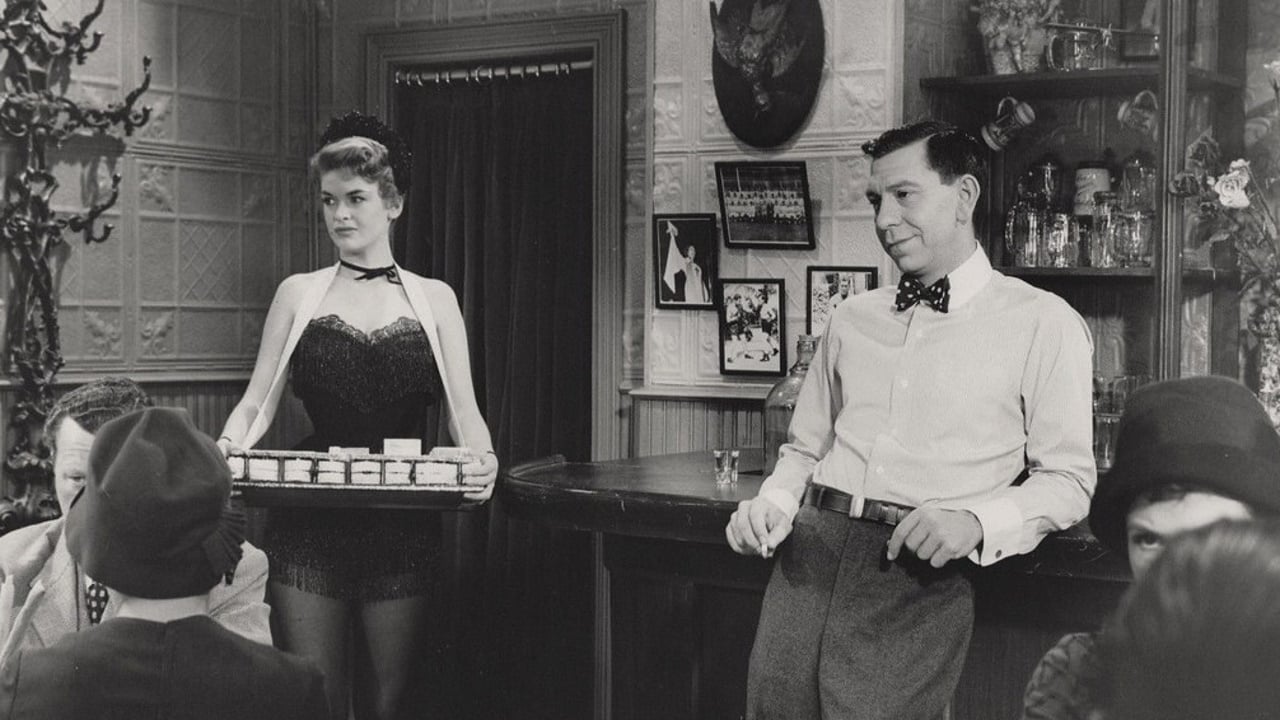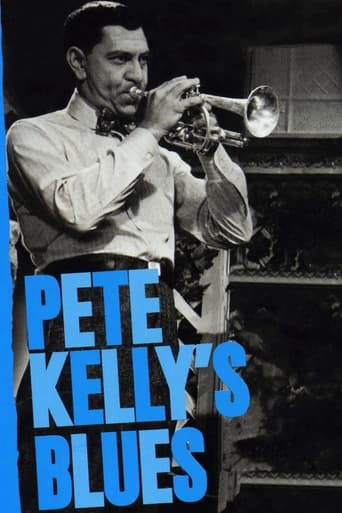



Simply A Masterpiece
everything you have heard about this movie is true.
View MoreDon't listen to the negative reviews
I think this is a new genre that they're all sort of working their way through it and haven't got all the kinks worked out yet but it's a genre that works for me.
View MoreI just watched this on Turner Classic Movies the other night after not having seen it in years, back when it was a pan-and-scan version loaded with commercials.It was great seeing it uncut and commercial-free in it's original letterboxed CinemaScope format. Director Jack Webb shows a creative visual imagination, and along with cameraman Hal Rosson he creates some decent period atmosphere, despite the limits of those early widescreen lenses. This would have been better in the old 3-strip Technicolor format, but that's really splitting hairs.The thing with this picture that never gets it off the ground is Jack Webb, the actor. He's just not believable as a jazzman. Despite Ella Fitzgerald, who is tremendous, and Peggy Lee, somewhat wasted in this role (in more ways than one) Webb is wooden and one-dimensional. Maybe Monty Clift or even Jeffrey Hunter would have been better. James Dean would have made this into a classic, despite the hackneyed storyline of musicians having to pay the mob to keep their gig.That plot point should have been a given, with the musicians doing their gig and paying the mob and playing their music against the backdrop of jazz age 1920's.This movie needed less plot and more atmosphere, and a better leading man. Webb the actor sinks this one.
View MoreA returning army vet travels to 1920's Kansas City and sets up a jazz band, only to fall prey to nightclub gangsters.Rather tedious film except for the blues offerings which are too few to make up for the slow pace and a dour Webb in the lead role. He's in about every scene, which means there's no escaping his non-acting. Actually, Webb's an interesting Hollywood figure. Dragnet (1951-1959) came along at just the right time for him. The Cold War meant authority was put in the best possible light, and Webb's Sgt. Friday embodied that no-nonsense professional. Plus, as director, Webb knew when to let human interest take charge, resulting in some of the best dramas of the day. Trouble is that, as an actor, Webb was a one-trick-pony. What worked so well in early Dragnet did not adapt to other scenarios, as is the case here. In fact, his romantic scenes with Leigh are almost painful. Plus, Dragnet's half-hour format enforced a pacing discipline that's not evident in this slow moving 90-minutes.Nonetheless, Warner's backed up production with colorful sets and eye-catching photography. So when the pace slows, the visuals don't. Then too, the supporting cast is just that, good support. Too bad, though, that Lee Marvin doesn't get more screen time. His upbeat tough guy amounts to a needed animated presence. I kept hoping he and Webb would have a snarling face-off— now that would be a real heavyweight treat. But I'm still wondering how they got a name performer like Janet Leigh to make do with such an incidental role.Anyway, the movie's mainly for fans of blues and vintage 20's styles. But it also looks like Webb learned a valuable lesson. Except for the misbegotten Last Time I Saw Archie (1961), his screen time would stick to either the authority figures or the voice-overs he was so good at.
View MoreNot only did Jack Webb star in the film, he also directed it. Trouble is that with his meek character at the beginning of the film, Webb was weak here and should have handed over the role to Bob Mitchum or Alan Ladd.That being said, the film chronicles the 1920s jazz era in Kansas City. Pete and other bands are subjected to the protection racket by Edmond O'Brien. When a drunken Martin Milner, a band member, resists, he is shot dead and Kelly (Webb) falls in line.Lee Marvin plays a band member who makes Kelly see the light and Janet Leigh is along for the ride as Kelly's love interest. With her '20's look, she is ready to start shimmering at any time.Credit must be given to Peggy Lee for her boozy moll to O'Brien. Her appearance on screen was memorable and she earned a supporting Oscar nomination for it. She was generally trying to make a take-off of Claire Trevor's Oscar win in 1948 for "Key Largo."After Kelly gets the nerve, the film turns into a shoot out by the end.
View MoreIt was Teddy Buckner playing the trumpet in the funeral scene that first turned me onto this film back in 1957.A Louis Armstrong - inspired trumpeter.(hear his "West End Blues" on the Goodtime Jazz album "Dixieland Jubilee")he totally outshone the eponymous Pete Kelly's playing throughout.(believed to have been ghosted by Jimmy McPartland). Ella Fitzgerald had a minor hit with a 78 of "Hard Hearted Hannah" b/w "Pete Kelly's blues".Although nearly half a century old,Webb's movie remains the best "jazz film" ever made.It was 100% fiction whereas "Bird" was 80% fiction presented as fact.Not that I'm knocking Clint Eastwood - it wouldn't have been made without his clout and it certainly served as an introduction to Charlie Parker's music. I absolutely agree with the people on this site who consider Jack Webb's contribution to films due for a revision."The D.I." is far better than it's reputation suggests and until F.Lee Ermey came along remained the ur USMC movie. "Pete Kelly's Blues" is an astonishingly accomplished piece of work. Mr Webb gets fine performances from veteran and tyro alike(although I am a dissenter in the "Peggy Lee for an Oscar" debate),she does well for a singer playing a singer but was wise not to give up her day job. The "Wild Party" scene is brilliantly orchestrated and never allowed to spiral out of Mr Webb's control.The complex relationship between gangster,jazz musician and cop is given the attention it merits and reflects the reality of the time. Pete Kelly himself is given verisimilitude by a marked physical resemblance to dixieland trumpeter Muggsy Spanier who would have been around at the same sort of time. In an era full of method actors over-emoting,Jack Webb could be said to be internalising his characters - or,on the other hand,you might think he was monolithic.Whichever,it made him stand out amongst his fellow thesps in an era when it wasn't considered the mark of a man to shed an easy tear. In the "Not a lot of people know that" dept.:- the solo banjo player is Harper Goff,member of the "Firehouse Five",a band formed by Walt Disney artists in the early fifties. You don't have to be a jazz lover to enjoy "Pete Kelly's blues",but if you watch it you might end up buying the sort of records your grandma used to dance to.
View More